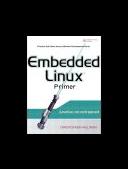Книга: Embedded Linux Primer: A Practical, Real-World Approach
8.1.1. Loadable Modules
8.1.1. Loadable Modules
Unlike some other operating systems, Linux has the capability to add and remove kernel components at runtime. Linux is structured as a monolithic kernel with a well-defined interface for adding and removing device driver modules dynamically after boot time. This feature not only adds flexibility to the user, but it has proven invaluable to the device driver development effort. Assuming that your device driver is reasonably well behaved, you can insert and remove the device driver from a running kernel at will during the development cycle instead of rebooting the kernel every time a change occurs.
Loadable modules have particular importance to embedded systems. Loadable modules enhance field upgrade capabilities; the module itself can be updated in a live system without the need for a reboot. Modules can be stored on media other than the root (boot) device, which can be space constrained.
Of course, device drivers can also be statically compiled into the kernel, and, for many drivers, this is completely appropriate. Consider, for example, a kernel configured to mount a root file system from a network-attached NFS server. In this scenario, you configure the network-related drivers (TCP/IP and the network interface card driver) to be compiled into the main kernel image so they are available during boot for mounting the remote root file system. You can use the initial ramdisk functionality as described in Chapter 6, "System Initialization," as an alternative to having these drivers compiled statically as part of the kernel proper. In this case, the necessary modules and a script to load them would be included in the initial ramdisk image.
Loadable modules are installed after the kernel has booted. Startup scripts can load device driver modules, and modules can also be "demand loaded" when needed. The kernel has the capability to request a module when a service is requested that requires a particular module.
Terminology has never been standardized when discussing kernel modules. Many terms have been and continue to be used interchangeably when discussing loadable kernel modules. Throughout this and later chapters, the terms device driver, loadable kernel module (LKM), loadable module, and module are all used to describe a loadable kernel device driver module.




